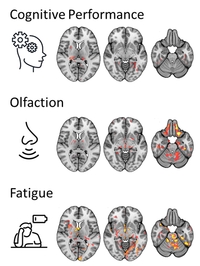Specific long-term symptoms of post-COVID syndrome (PCC)—impaired cognitive function, impaired olfactory function, and fatigue—are significantly associated with diffusion microstructure imaging (DMI) findings in specific cerebral networks, according to research presented on Sunday.

Rau
"Our study enrolled 89 patients diagnosed with PCC and compared them to matched healthy controls and individuals who had contracted COVID-19 but did not develop PCC," said presenter Alexander Rau, MD, from the Departments of Radiology and Neuroradiology at University Hospital Freiburg in Germany. "Here, conventional MR imaging did not reveal alterations, whereas advanced DMI revealed a microstructural shift from the membrane-enclosed compartment to the free water/cerebrospinal fluid compartment, indicating microstructural alterations with an emphasis on the gray matter."
The degree of this volume shift was positively associated with the severity of initial COVID-19 infection, the investigators found. In addition, they identified patterns of microstructural alterations that appeared to specifically correlate with the patients' identified symptoms.
Cognitive performance was measured by the Montreal Cognitive Assessment test, olfactory performance by Sniffin' Sticks results, and fatigue by the Würzburger Fatigue Inventory for MS. Of the patients with PCC, cognitive performance was impaired in 41%, while olfactory performance suffered in 73% and fatigue presented in 78%. More than half of those patients (53%) were unable to return to their previous level of independence or employment.
To explore how microstructural differences correlated with PCC-associated symptoms, the investigators compared voxel-based assessment of volume with the patients' clinical scores.
"The clear and specific association we observed between PCC-related symptoms and particular cerebral networks hints at a pathophysiological relevance between clinical symptoms and changes in brain microstructure," Dr. Rau said.
And differences didn't only appear in symptomatic patients. Compared with healthy controls, Dr. Rau noted, changes were evident in volunteers who had recovered from COVID-19 but did not develop PCC. "The alterations we noted in all COVID-19 survivors had a different emphasis in patients with and without post-COVID condition."

"We don't exactly know where this comes from; it's highly speculative," Dr. Rau said. "It's something that definitely needs more investigation."
To assemble the patient cohort, the interdisciplinary research team recruited individuals who exhibited neurocognitive symptoms in the chronic phase after a COVID-19 infection. They came to their neurological Post-COVID outpatient clinic via both referrals from general practitioners and self-referrals. Among the inclusion criteria was the absence of a history of neurodegenerative disorders.
These findings warrant further research to identify biomarkers that could predict the disease course of—and identify those at risk of developing—PCC, Dr. Rau explained. With PCC affecting people across the globe in high numbers, the results from this study could provide valuable insights into the pathophysiological basis of the syndrome.
"An interdisciplinary setting was essential to this research," Dr. Rau emphasized. "Neurologists enrolled and characterized the patients. Without the collaboration among different disciplines, this research would never have been possible."
Access the presentation, "Cerebral Microstructural Alterations in Post-COVID-Condition Are Related to Cognitive Impairment, Olfactory Dysfunction and Fatigue," (S4-SSNR01-4) on demand at Meeting.RSNA.org..

